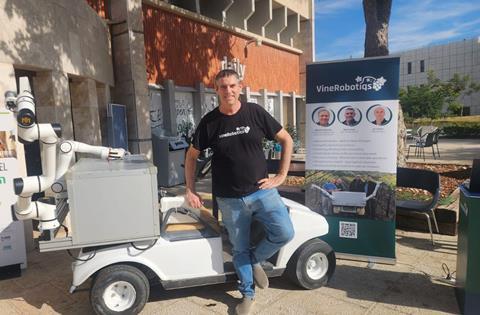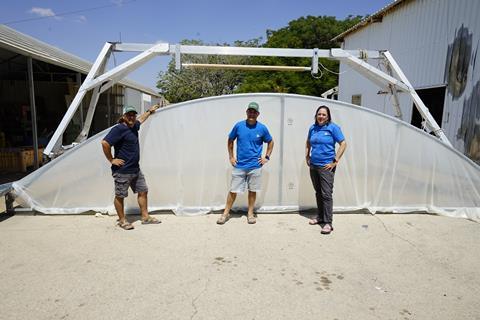A number of Israeli start-up companies offered their solutions to sustainability and food security issues at last month’s Food Sec & Tech conference in Sderot, in southern Israel

Last month saw the return of Israel’s International Food Sec & Tech conference, the second edition of the event held in Sderot in southern Israel, a small city that was badly affected by the events of 7 October 2023.
The vulnerability of Israel’s food security has been emphasised by multiple events, including Israel’s prolonged war in Gaza, the departure of thousands of Thai agricultural workers after 7 October, the Covid-19 pandemic and the war in Ukraine, which met at least 70 per cent of Israel’s wheat demands. In addition, the average age of the Israeli farmer is now a staggering 65 years old.
Responding to such issues, multiple start-up companies offered their solutions at the event. Here is a selection of those exhibitors.
Platypus EcoDesign
As published in Journal of Agricultural and Environmental Ethics by Dr David Pimental in 1995, the Platypus development is based on the assumption that, “of a global pesticide consumption of over 4mn tonnes per year, only 0.1 per cent of the applied pesticides reach the target pest and the other 99.9 per cent pollutes the environment, enters the food cycle and damages human health”. The Platypus development offers an innovative delivery system for volatile bioactive compounds like essential oils and pheromones.
This groundbreaking platform provides controlled, prolonged release of active ingredients, reducing waste, minimising environmental impact and enhancing pest control effectiveness. Aiming to cut development costs in half and to accelerate regulatory approvals, Platypus aims to enable manufacturers to bring eco-friendly pest control solutions to market much faster.
Marina Arshavsky, CBO at Platypus, commented: “Platypus technology aims to empower agriculture, food supply chains and home garden industries to replace traditional chemical pesticides with safer, more sustainable alternatives. With its innovative approach, Platypus is driving a transformation in pest control, offering a cleaner, healthier future for people and the planet.”
RumaFeed
Initiated as a project at the Faculty of Agriculture of the Hebrew University, RumaFeed has developed new varieties of potatoes that eliminate the presence of solanine, a toxic glycoalkaloid present in potato plants. This enables potato haulm utilisation, creating a whole new revenue stream while significantly contributing to resolving the food and feed crisis. The option to use potato haulm as a feed, and not have to eliminate it by burning or by the use of toxic herbicides, offers a significant economic advantage.
Oded Ilan, CEO of RumaFeed, said: “Additional advantages in the use of this innovative technology are longer shelf-life for potatoes and less greening of the tuber. We also generate a substantial increase in protein in potatoes and reduce the processing cost for protein and starch.”
The technology is based on genetic engineering (Crispr) without any genetic modification. RumaFeed is now looking at the reduction of solanine present in tomato foliage.
VineRobotiqs
The vine is the fastest growing of trees. Branches grow arbitrarily wild, striving for light. The bunches tend to be messy, with twisted tendrils everywhere. As hundreds of bunches start to flourish, a proper dilution is a must to get the required quality of product. Quality is defined by some 20-30 factors, including size, shape, density, taste, colour and shelf-life, achievable by properly executing the right actions all year around. Thus, maintaining high quality viticulture and cultivation expertise is critical for farm profitability. The massive use of temporary human labour is spent on cultivation tasks, labour being up to 60 per cent of total expenditure.
The need for AI and robotics has been created by the ever-waning availability of labour in many grape-producing countries. The VineRobotiqs solution utilises a best-in-class AI real-time control system. The robot executes a recipe defined by the farmer. There are tens of recipe types and adjustment parameters that enable a best fit to the most updated practices in vineyard viticulture. The company uses a modern cloud-based BI-SAS system to keep decision-making optimal through a continuous improvement process.
VineRobotiqs systems are set to be able to work 24/7 along vineyard rows, carrying-out exactly the detailed programme defined by vine experts for the specific plantation and conditions. Tasks are done at the appropriate time, aiming to achieve best bunch quality and a better market price.
CoverDolly
Inspired by the crisis of war and absence of labour, CoverDolly came to being shortly after 7 October, a startup to develop an automated solution to make greenhouse covering easier and more efficient, even in extreme conditions.
Ahi Sitbon, a vegetable farmer cultivating close to Gaza, was visited by a long-standing friend, Ora Nakash, a woman with expertise in information system design and software. They discussed a major challenge facing Sitbon. Closing the greenhouses for winter planting before the rainy season was being carried out by external contractors who would bring in teams of ten skilled workers to climb onto the greenhouse roof and spread plastic sheeting, which can be as large as ten metres by one hundred metres.
“It’s a huge challenge, especially with alarms going off, wind and sun, and it’s not a job for volunteers,” said Sitbon. “I simply didn’t have the manpower for it.”
Discovering that no machine existed for such a job, Nakash recruited another mutual friend, Gilad Meller, an independent mechanical engineer who specialises in robotics and automation, and the team set out to build one. That’s the origin of the CoverDolly, described by Meller as “an autonomous robotic platform that runs on top of the greenhouse, removing used plastic sheets, installing new ones, and eliminating the risk that humans face in doing such a job, while doing it in an efficient and controlled manner”.




